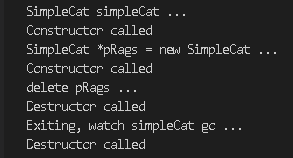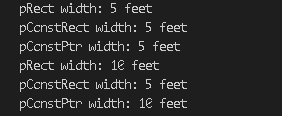《c++入门经典》笔记11
《c++入门经典》笔记11
第十一章 开发高级指针
11.1在堆中创建对象
实际上,类就是对象的类型,对象也是一种变量,所以你可以在堆中创建int型变量,自然也就能创建自定义型变量。
Cat *pCat = new Cat;
这将调用默认构造函数(无参构造函数),每当在堆或栈中创建对象时,都将调用构造函数。
11.2删除对象
对指向堆中对象的指针调用delete时,将调用对象的析构函数,然后释放内存。
程序清单11.1 HeapCreator.cpp
#include <iostream>
class SimpleCat
{
public:
SimpleCat()
{
std::cout << "Constructor called\n";
itsAge = 1;
}
~SimpleCat()
{
std::cout << "Destructor called\n";
}
private:
int itsAge;
};
int main()
{
std::cout << "SimpleCat simpleCat ...\n";
SimpleCat simpleCat;
std::cout << "SimpleCat *pRags = new SimpleCat ...\n";
SimpleCat *pRags = new SimpleCat;
std::cout << "delete pRags ...\n";
delete pRags;
std::cout << "Exiting, watch simpleCat go ...\n";
return 0;
}

这里最后一个Destructor called是因为main()函数结束时,simpleCat对象不再在作用域中,所以编译器调用其析构函数。
11.3使用指针访问成员
方法一(解引用运算符):
(*pRags).getAge();
方法二(指向运算符->):
pRags->getAge();
程序清单11.2 HeapAccessor.cpp
#include <iostream>
class SimpleCat
{
public:
SimpleCat()
{
itsAge = 2;
}
~SimpleCat()
{
std::cout << "Destructor called\n";
}
int getAge() const { return itsAge; }
void setAge(int age) { itsAge = age; }
private:
int itsAge;
};
int main()
{
SimpleCat *simpleCat = new SimpleCat;
std::cout << "simpleCat is " << (*simpleCat).getAge() << " years old"
<< "\n";
simpleCat->setAge(5);
std::cout << "simpleCat is " << simpleCat->getAge() << " years old"
<< "\n";
return 0;
}

11.4堆中的数据成员
类可能有一个或多个数据成员为指针,并指向堆中的对象。可在构造函数或成员函数中分配内存,并在析构函数中释放内存。
程序清单11.3 DataMember.cpp
#include <iostream>
class SimpleCat
{
public:
SimpleCat()
{
itsAge = new int(2);
itsWeight = new int(5);
}
~SimpleCat()
{
delete itsAge;
delete itsWeight;
}
int getAge() const { return *itsAge; }
void setAge(int age) { *itsAge = age; }
int getWeight() const { return *itsWeight; }
void setWeight(int weight) { *itsWeight = weight; }
private:
int *itsAge;
int *itsWeight;
};
int main()
{
SimpleCat *simpleCat = new SimpleCat;
std::cout << "simpleCat is " << simpleCat->getAge() << " years old"
<< "\n";
simpleCat->setAge(5);
std::cout << "simpleCat is " << simpleCat->getAge() << " years old"
<< "\n";
return 0;
}

11.5this指针
每个类成员函数都有一个隐藏的参数——this指针,它指向用于调用函数的对象。
通常,在成员函数中,无需使用this指针来访问当前对象的成员变量,如果愿意,可以显示地使用this指针。
程序清单11.4 This.cpp
#include <iostream>
class Rectangle
{
private:
int itsLength;
int itsWidth;
public:
Rectangle();
~Rectangle();
void setLength(int length) { this->itsLength = length; }
int getLength() const { return this->itsLength; }
void setWidth(int width) { this->itsWidth = width; }
int getWidth() const { return this->itsWidth; }
};
Rectangle::Rectangle()
{
itsWidth = 5;
itsLength = 10;
}
Rectangle::~Rectangle()
{
}
int main()
{
Rectangle theRect;
std::cout << "theRect is " << theRect.getLength() << " feet long." << std::endl;
std::cout << "theRect is " << theRect.getWidth() << " feet wide." << std::endl;
theRect.setLength(20);
theRect.setWidth(10);
std::cout << "theRect is " << theRect.getLength() << " feet long." << std::endl;
std::cout << "theRect is " << theRect.getWidth() << " feet wide." << std::endl;
return 0;
}

11.6悬垂指针
悬垂指针又称为野指针或者迷失指针,指的是对指针调用了delete(释放其指向的内存)之后,没有重新赋值(即没有重新初始化)就开始被使用的指针。
实际上上章笔记中delete关键字时就已经提到野指针的危害。所以进行delete之后应该重新new赋值或者设置为nullptr。
11.7const指针
声明指针时,可在类型前、类型后或者两个地方都使用const。
const int *pOne;//指向常量的指针 int * const pTwo;//常量指针 const int * const pThree;//指向常量的常量指针三条语句意义各不相同,三个指针类型也各不相同。
pOne是指向整型常量的指针,也就是编译器默认它指向的是一个常量(虽然可能不是),所以不能通过这个指针来更改所指向的常量(编译器认为是常量但不一定是)的值,比如
*pOne = 5;编译器就会报错。int one = 10; const int * pOne = &one; *pOne = 5;//报错,表达式必须是可修改的左值,但此时*pOne被认为不可修改pTwo是指向整型的常量指针,可以修改指向的整型变量,但是pTwo不能指向其他变量。
int two = 20; int * const pTwo = &two; *pTwo = 15; pTwo = &one;//报错,不能指向别的变量pThree是一个指向整型常量的常量指针,不能修改它指向的值,也不能让它指向其他变量。
int three = 30; const int * const pThree = &three; pThree = &one;//报错,不能指向别的变量 *pThree = 25;//报错,此时*pThree被认为不可修改
完整代码:(注释起来的是报错的)
#include <iostream>
int main()
{
int one = 10;
const int * pOne = &one;
// *pOne = 5;
int two = 20;
int * const pTwo = &two;
*pTwo = 15;
// pTwo = &one;
int three = 30;
const int * const pThree = &three;
// pThree = &one;
// *pThree = 25;
std::cout<<"one: "<<one<<" *pOne: "<<*pOne<<std::endl;
std::cout<<"two: "<<two<<" *pTwo: "<<*pTwo<<std::endl;
std::cout<<"three: "<<three<<" *pThree: "<<*pThree<<std::endl;
return 0;
}

11.8const指针与const成员函数
程序清单11.5 ConstPointer.cpp
#include <iostream>
class Rectangle
{
private:
int itsLength;
int itsWidth;
public:
Rectangle();
~Rectangle();
void setLength(int length) { itsLength = length; }
int getLength() const { return itsLength; }
void setWidth(int width) { itsWidth = width; }
int getWidth() const { return itsWidth; }
};
Rectangle::Rectangle() : itsWidth(5), itsLength(10) //初始化列表
{
}
Rectangle::~Rectangle() {}
int main()
{
Rectangle *pRect = new Rectangle;
const Rectangle *pConstRect = new Rectangle; //pConstRect为指向Rectangle常量型对象的指针
Rectangle *const pConstPtr = new Rectangle; //pConstPtr为指向Rectangle型对象的常量指针
std::cout << "pRect width: " << pRect->getWidth() << " feet\n";
std::cout << "pConstRect width: " << pConstRect->getWidth() << " feet\n";
std::cout << "pConstPtr width: " << pConstPtr->getWidth() << " feet\n";
pRect->setWidth(10);
//pConstRect->setWidth(10);
pConstPtr->setWidth(10);
std::cout << "pRect width: " << pRect->getWidth() << " feet\n";
std::cout << "pConstRect width: " << pConstRect->getWidth() << " feet\n";
std::cout << "pConstPtr width: " << pConstPtr->getWidth() << " feet\n";
return 0;
}




 浙公网安备 33010602011771号
浙公网安备 33010602011771号